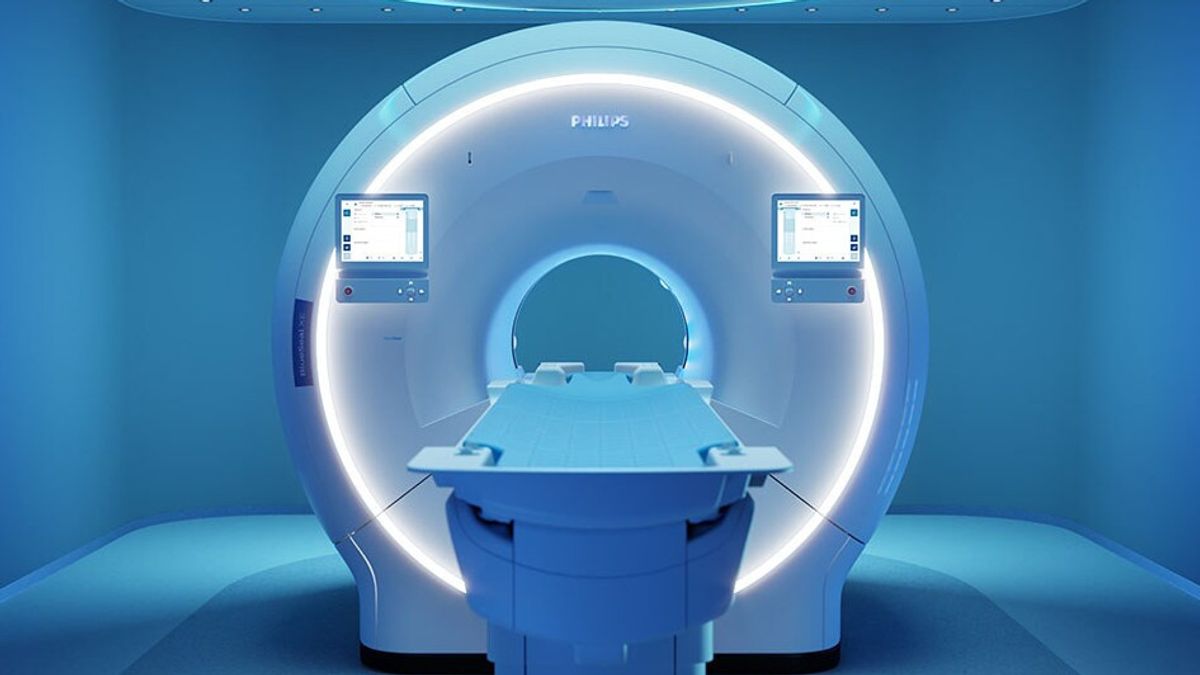JAKARTA - The health industry, as the fifth largest contributor to CO2 emissions globally, is responsible for more than 4% of this number even exceeding the aviation and shipping industries.
To that end, Royal Philips (NYSE: PHG, AEX: PHILIA), a global leader in health technology, launched its newest MRI BlueSeal 1.5T scanner with a wider bore diameter and environmentally friendly design at RSNA 2024, the world's medical imaging conference in Chicago, Illinois, United States.
This latest Scanner has an environmentally friendly design with a bore diameter as wide as 70 cm, integrated with an MR Smart Workflow solution supported by Artificial Intelligence (AI) innovation. This innovation aims to improve access to patient health services with quality diagnostic scans, thereby helping to increase the number of patient scans every day, and meeting the needs of high health services.
In addition, our consumers are increasingly aware of the role of the importance of sustainable health services in achieving public health goals in the long term. They are now increasingly turning to health technology companies such as Philips to get support in overcoming these challenges. Therefore, in addition to providing better access to health services, this innovation is part of Philips' long-term commitment to support global shifts to more sustainable health services, including the Indonesian government's target of achieving Net-Zero Emission by 2050," said Astri Ramayanti Dharmawan, President Director of Philips Indonesia.
Health leaders in Indonesia are also increasingly committed to achieving a sustainable health sector, as reflected in the 2024 Philips Future Health Index report in Indonesia, where 99% of leaders surveyed believe that efforts to reduce CO2 emissions and the environmental impact of health services should be prioritized by health organizations. In addition, 97% of health leaders feel that this issue should be a top priority for the government. These figures are higher than the global average health leaders, namely 86% and 90%, respectively.
In addition, about 51% of health leaders also agree that sustainable procurement, including the procurement of circular equipment, is the main strategy and is currently being implemented by them. Meanwhile, 39% of these health leaders plan to adopt it in the next three years.
As a global leader in health technology, Philips' long-term commitment to Environmental, Social, and Governance (ESG) principles has been recognized globally. Philips has also embedded a sustainability system into end-to-end business operations, driving sustainable value across business chains in the health industry. Such as procurement, operations, innovation, service delivery, supply chains, and others.
MRI Scanner from Philips, equipped with BlueSeal technology and has installed more than 1,500 units globally, has saved more than 2.75 million helium liters since 2018. The industry's first helium-free MRI Scanner portfolio is an important step in the right direction, as it overcomes the global scarcity of helium, with MRI scanner becoming the largest helium consumer.
Furthermore, Philips also showed some of his latest innovations that can help hospitals and health services in providing high quality, affordable, and also be sustainable health services for patients consistently at the 2024 RSNA.
SEE ALSO:
The Philips Radiology Operations Command Center (ROCC) is a multi-vendor virtual image support solution[6], multi-modality, the first multi-site in the industry to seamlessly connect Medical Imaging Experts (Medical Imaging) at a command center with Technology at a scanning site across the imaging network in real-time. With remote monitoring access, ROCC innovation can reduce travel time between location and scanning, helping reduce emissions, while providing opportunities for health experts to focus on patients as well as their workflows.
Philips Cardiovascular Workspace, which can be accessed anytime and anywhere, allows users to combine in-depth clinical expertise with technological innovation to safely connect patients, health workers, and data throughout the cardiovascular care environment. By providing access to clinical interoperability to multiple systems and applications from one location, Philips Cardiovascular Workspace allows efficient data analysis, reduces clinical decision making time to increase the patient's outcome, and saves overall costs.
"In our organization, our commitment to encouraging change is not only made in our business operations, but we are also collaborating with our key stakeholders, including our customers, patients, and suppliers. By collaborating to take advantage of our collective expertise, digital innovation capabilities, and a shared push to make systemic changes, we are able to combine sustainable practices and support environmentally friendly health services with a safe, efficient, and effective treatment method, while improving service access and promoting better health services for more people", concluded Astri.
The English, Chinese, Japanese, Arabic, and French versions are automatically generated by the AI. So there may still be inaccuracies in translating, please always see Indonesian as our main language. (system supported by DigitalSiber.id)
















